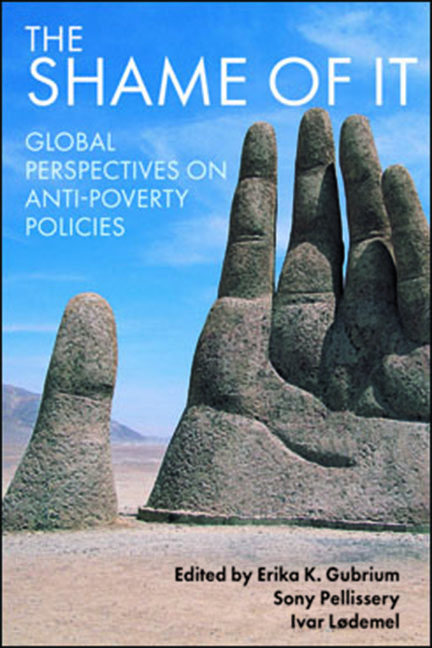Book contents
- Frontmatter
- Dedication
- Contents
- Notes on contributors
- Acknowledgements
- Preface
- one Resetting the stage
- two New urban poverty and new welfare provision: China’s dibao system
- three Thick poverty, thicker society and thin state: policy spaces for human dignity in India
- four Self-sufficiency, social assistance and the shaming of poverty in South Korea
- five ‘Not good enough’: social assistance and shaming in Norway
- six Pakistan: a journey of poverty-induced shame
- seven Separating the sheep from the goats: tackling poverty in Britain for over four centuries
- eight ‘Food that cannot be eaten’: the shame of Uganda’s anti-poverty policies
- nine Shame and shaming in policy processes
- ten Towards global principles for dignity-based anti-poverty policies
- Index
one - Resetting the stage
Published online by Cambridge University Press: 03 February 2022
- Frontmatter
- Dedication
- Contents
- Notes on contributors
- Acknowledgements
- Preface
- one Resetting the stage
- two New urban poverty and new welfare provision: China’s dibao system
- three Thick poverty, thicker society and thin state: policy spaces for human dignity in India
- four Self-sufficiency, social assistance and the shaming of poverty in South Korea
- five ‘Not good enough’: social assistance and shaming in Norway
- six Pakistan: a journey of poverty-induced shame
- seven Separating the sheep from the goats: tackling poverty in Britain for over four centuries
- eight ‘Food that cannot be eaten’: the shame of Uganda’s anti-poverty policies
- nine Shame and shaming in policy processes
- ten Towards global principles for dignity-based anti-poverty policies
- Index
Summary
In 1971, sociologist Robert Pinker made a frank observation about the field of social policy: ‘We know much more about the sentiments of philosophers and social scientists than those of ordinary people in everyday life’ (1971, p 135). The statement is as relevant today as it was then. Whether focused in the global South on intensive development and reconstruction, or in the global North on moving the long-term unemployed into the labour market, public social policy approaches all too frequently ‘take for granted the subjective perceptions of ordinary people’ (1971, p 136) rather than subjecting them to empirical investigation. This is predicated on the understanding of poverty as a personal failure (Walker, 2014). This understanding has had a great bearing on the policy solutions that are posed.
The solutions typically derive from microeconomics and behavioural psychology (see Becker, 1976; Elster, 1989; Kahneman and Tversky, 2000). Both traditions habitually put into place experience-distant understandings of everyday life, distant from both the ordinary practices and the diverse contexts and relational meanings of socioeconomic differences. They rarely, if ever, attend to the everyday logics of conduct. The chapters in this volume feature the ordinary experiences and perceptions of those whose lives are directly affected, and subject them to empirical scrutiny.
New insights
If late in coming, the time is ripe for resetting the stage by placing the lives of the recipients of anti-poverty measures front and centre, bringing these life experiences into the world of policy research. This volume shares that mission with two concurrent texts – Poverty and shame, a monograph authored by Robert Walker (2014), and The shame of poverty: Global experiences, a volume edited by Elaine Chase and Grace Bantebya Kyomuhendo (2014). Different in emphases, these texts build on the same body of empirical research as do the chapters of this volume. The research was part of a broad, Economic and Social Research Council (ESRC)-funded cross-national comparative qualitative study, titled ‘Shame, social exclusion and the effectiveness of anti-poverty programmes: A study in seven countries’. With Walker at the helm, the study has had local teams of researchers across the seven settings engaged in intensely collaborative work for a two-and-a-half-year period. Across the seven settings in focus, the authors in this volume have explored in-depth the links that may exist between poverty and shame.
- Type
- Chapter
- Information
- The Shame of ItGlobal Perspectives on Anti-Poverty Policies, pp. 1 - 16Publisher: Bristol University PressPrint publication year: 2013



